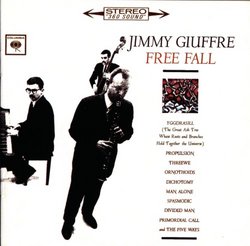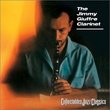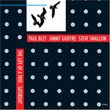| All Artists: Jimmy Giuffre, Paul Bley, Steve Swallow Title: Free Fall Members Wishing: 3 Total Copies: 0 Label: Sony Release Date: 9/1/1998 Album Type: Original recording remastered Genres: Jazz, Special Interest, Pop Styles: Avant Garde & Free Jazz, Cool Jazz Number of Discs: 1 SwapaCD Credits: 1 UPC: 074646544624 |
Search - Jimmy Giuffre, Paul Bley, Steve Swallow :: Free Fall
 | Jimmy Giuffre, Paul Bley, Steve Swallow Free Fall Genres: Jazz, Special Interest, Pop
Clarinetist Jimmy Giuffre was solidly established as the leader of unorthodox but coolly restrained groups when he enlisted pianist Paul Bley and bassist Steve Swallow in 1961. With this trio, he would take listeners into ... more » |
Larger Image |
CD DetailsSynopsis
Amazon.com Clarinetist Jimmy Giuffre was solidly established as the leader of unorthodox but coolly restrained groups when he enlisted pianist Paul Bley and bassist Steve Swallow in 1961. With this trio, he would take listeners into challenging terrain and offer the avant-garde a different direction--witness the 2-CD reissue 1961. Often taking its style cues from European modernism, this group mixed pointillism and atonality while moving seamlessly between composition and free improvisation. Free Fall, from 1962, was the group's ultimate recording and Giuffre's most radical statement, balancing duos and trios with unaccompanied clarinet improvisations that explored novel sounds, spontaneous structure, and uncommon brevity. Quietly revolutionary and brilliant in itself, this music was the culmination of the "Third Stream" synthesis and also paved the way for a younger generation of radicals. Today it still sounds fresh. This CD restores edited portions and adds five unissued clarinet solos that range from spiky inventions to the original lyricism of "Future Plans." -- Stuart Broomer Similar CDs
|
CD ReviewsIf you gush over Streisand and Diana Ross, this is not for u Indian music lover | Portland, Oregon | 08/06/2001 (5 out of 5 stars) "Too bad Mickey Trotter's one-star review had to pull this down. Check out his More About Me page....stick with Motown and La Streisand, Mick. Also, I don't believe you really like Ornette's Shape of Jazz to Come...Free Fall is a masterpiece of subtlety and invention. Free jazz, as great as much of it was, would have benefited from a solid dose of Giuffre's influence." Out on a Limb Early Autumn | Salzburg, Austria | 02/23/2002 (4 out of 5 stars) "There once was a Lennie Tristano tune called "Out on a Limb", but while the pianist's contributions to the realm of free music has been known for decades, this Giuffre album has been a hidden treasure for more than 30 years ... and I can't help asking why?! Perhaps because this music can't be defined as jazz in the purest sense, it's obviously white and bears no traces of black improvised music at all. By the time of the recording ('62) Jimmy Giuffre had found a musical language all his own and even abandoned his well-known clarinet chalumeau sound, which had rightfully made him one of the princes of the 50's West Coast Scene, in order to develop something new, though you'll still recognize him very easily. The music has much in common with European improvised music, Schoenberg unmistakably just around the corner. It doesn't swing , except for some bars where especially Steve Swallow shows that this is a jazz ensemble after all. But it's not merely an experiment but an accomplished invention, almost a feat. The trio is undoubtedly well-rehearsed and that makes me wonder why JG relied so much on playing solo, where he encounters his creative limits sometimes before he has come to a logic end. It leaves something to desire, even more he would never again be given the opportunity to record with musicians of that calibre (Swallow/Bley) for a major company. But they were really "out on a limb" and one only needs to take a glimpse at the current improvised music landscape in Europe to discover that this group was a tough forerunner." Stunning! It should be more famous lexo1941 | Edinburgh, Scotland | 02/21/2008 (5 out of 5 stars) "I came to this album as a fan of free jazz (and indeed free improvisation) who was chiefly interested in Jimmy Giuffre because he'd played with Jim Hall, a mainstream jazz guitarist whose work I love. I read the back of the CD with a certain amount of surprise, as I'd never heard Giuffre's stuff and assumed on the basis of descriptions I'd read of his work that he was a fairly mainstream figure.
Imagine my surprise. 'Free Fall' is nothing less than one of the most ground-breaking and brilliant recordings in jazz, an essential counterpart to other more famous (and equally fine) contemporary ventures into pure improvisation like Ornette Coleman's 'Free Jazz' and John Coltrane's 'Ascension'. Giuffre's album sounds nothing like either of those great recordings, but it is no less intense, imaginative and ahead of its time. The clarinet is an instrument that I normally associate with older jazz, apart of course from the bass clarinet of the late great Eric Dolphy, and Giuffre's playing here is a revelation (at least, to me). His attention to timbre and tone is acute. Some of this music reminds me (in a good way) of the chamber music of one of my favourite modern composers, Anton Webern. Paul Bley and Steve Swallow provide forward-thinking and acute accompaniment on a good number of the cuts, but I think that this is really Giuffre's record. He summons up a huge variety of moods from the humble clarinet. This CD has changed my mental picture of the history of jazz. It ought to be on anyone's top 10 list of great avant-jazz recordings of the 60s. Not to be missed." |

 Track Listings (16) - Disc #1
Track Listings (16) - Disc #1

